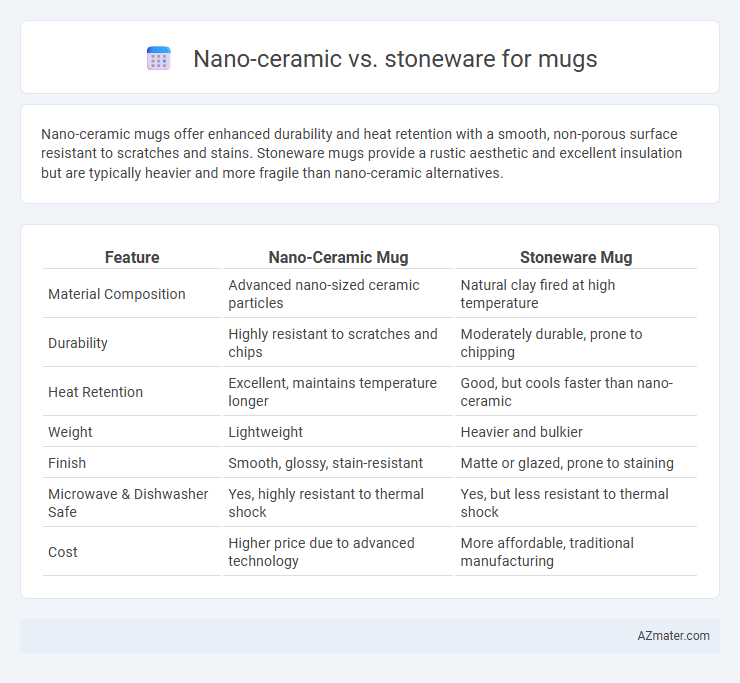Nano-ceramic mugs offer enhanced durability and heat retention with a smooth, non-porous surface resistant to scratches and stains. Stoneware mugs provide a rustic aesthetic and excellent insulation but are typically heavier and more fragile than nano-ceramic alternatives.
Table of Comparison
| Feature | Nano-Ceramic Mug | Stoneware Mug |
|---|---|---|
| Material Composition | Advanced nano-sized ceramic particles | Natural clay fired at high temperature |
| Durability | Highly resistant to scratches and chips | Moderately durable, prone to chipping |
| Heat Retention | Excellent, maintains temperature longer | Good, but cools faster than nano-ceramic |
| Weight | Lightweight | Heavier and bulkier |
| Finish | Smooth, glossy, stain-resistant | Matte or glazed, prone to staining |
| Microwave & Dishwasher Safe | Yes, highly resistant to thermal shock | Yes, but less resistant to thermal shock |
| Cost | Higher price due to advanced technology | More affordable, traditional manufacturing |
Introduction to Mug Materials: Nano-Ceramic vs Stoneware
Nano-ceramic mugs feature advanced ceramic technology with a nanoscale structure that enhances durability, heat retention, and resistance to chipping compared to traditional materials. Stoneware mugs are crafted from dense clay fired at high temperatures, offering a rustic aesthetic, excellent thermal insulation, and natural porosity that contributes to unique glaze finishes. Both materials provide distinct benefits in terms of strength, heat retention, and design versatility, making them popular choices for everyday and specialty coffee mugs.
What is Nano-Ceramic? Key Features and Benefits
Nano-ceramic is an advanced material composed of nanoparticles integrated into a ceramic matrix, offering exceptional durability and scratch resistance for mugs. Its key features include high thermal stability, non-porous surface preventing stains and odors, and enhanced resistance to chipping compared to traditional stoneware. Benefits of nano-ceramic mugs include prolonged lifespan, superior heat retention, and ease of cleaning, making them ideal for everyday use.
Understanding Stoneware: Characteristics and Advantages
Stoneware mugs are crafted from dense, vitrified clay fired at high temperatures, offering exceptional durability and resistance to chipping. Their natural, earthy texture provides excellent heat retention, keeping beverages warm longer compared to other materials. Stoneware is also non-porous and glaze-coated, ensuring stain resistance and easy cleaning, making it a practical choice for everyday use.
Durability Face-Off: Nano-Ceramic vs Stoneware
Nano-ceramic mugs offer superior durability due to their enhanced composition, making them highly resistant to chipping, cracking, and thermal shock compared to traditional stoneware. Stoneware mugs, while durable and sturdy, are more prone to surface wear and breakage due to their porous nature and lower resistance to sudden temperature changes. Choosing nano-ceramic ensures longer lifespan and better performance in everyday use, especially for users seeking resilience in drinkware.
Heat Retention: Which Mug Keeps Your Drink Hotter?
Nano-ceramic mugs offer superior heat retention compared to stoneware due to their advanced thermal conductivity and denser material structure, keeping drinks hotter for longer periods. Stoneware mugs, while durable, tend to lose heat more quickly because of their porous composition and thicker walls. For those prioritizing extended warmth, nano-ceramic mugs provide a more efficient insulation solution to maintain drink temperature.
Design and Aesthetic Appeal Comparison
Nano-ceramic mugs offer a sleek, glossy finish with vibrant color retention due to the advanced nanotechnology glaze, enhancing their modern and sophisticated look. Stoneware mugs provide a rustic, earthy texture with natural variations in glaze, appealing to those who prefer a handcrafted, artisanal aesthetic. The choice between nano-ceramic and stoneware largely depends on desired durability of color vibrancy versus a timeless, organic design style.
Safety and Health Considerations
Nano-ceramic mugs feature a non-toxic, lead-free glaze that offers superior resistance to chipping and bacterial growth, making them a safer choice for daily use. Stoneware mugs, while durable, may contain trace amounts of lead or cadmium if not properly manufactured, posing potential health risks over time. Both materials should be verified for food-safe certifications to ensure no harmful chemicals leach into beverages during hot or prolonged use.
Maintenance and Cleaning: Ease of Use
Nano-ceramic mugs resist stains and odors due to their ultra-smooth, non-porous surface, making them easy to clean with minimal effort; they are often dishwasher safe and less prone to staining compared to stoneware. Stoneware mugs, while durable and heat-retentive, have a slightly porous glaze that may absorb oils and stains over time, requiring more thorough hand washing and occasional deep cleaning to maintain appearance. Choosing nano-ceramic ensures low-maintenance usage with superior stain resistance, enhancing convenience in daily cleaning routines.
Cost Analysis: Nano-Ceramic vs Stoneware Mugs
Nano-ceramic mugs generally cost more upfront due to advanced manufacturing techniques and enhanced durability features compared to traditional stoneware mugs. Stoneware mugs offer a more budget-friendly option with lower production costs but may require more frequent replacement due to chipping or cracking. Long-term cost analysis shows nano-ceramic mugs provide better value through longevity and resistance to stains, despite higher initial investment.
Which Mug Material Is Right for You?
Nano-ceramic mugs offer superior durability, stain resistance, and heat retention due to their advanced microscopic ceramic coating, making them ideal for long-lasting use and maintaining beverage temperature. Stoneware mugs provide a classic, rustic aesthetic with excellent heat insulation and a heavier, handcrafted feel, perfect for those who value traditional craftsmanship and organic design. Choosing between nano-ceramic and stoneware depends on your preference for durability and modern technology versus artisanal texture and natural appeal.

Infographic: Nano-ceramic vs Stoneware for Mug
 azmater.com
azmater.com